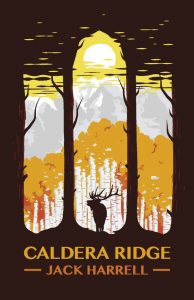 Review
Review
Title: Caldera Ridge
Author: Jack Harrell
Publisher: Signature Books
Genre: Fiction
Year of Publication: 2018
Number of Pages: 299
Binding: Hardcover
ISBN13: 978-1-56085-270-4
Price: $29.95
Reviewed by Julie J. Nichols for the Association for Mormon Letters, Sept. 12, 2018
Kail Lambert, 35, is trying to put his life together after an almost-affair with Robin, a woman he first met sixteen years ago. He only kissed her once, but he believes he loved her, and he’s trying to get over it by moving far away from where Robin lives. Kail’s wife, Charlene, has agreed to move back with their children to the backwater Idaho town where they met so that they can start over, but she’s bitter and cold about his almost-philandering. He keeps asking questions about destiny and free will that she can’t relate to: did God know Kail would keep on loving Robin? Does God know what’s next? Is there free agency? Or not?
Charlene’s father, Jonas, was instrumental in converting Kail to Mormonism, so Kail is eager to reconnect with him and pursue these questions. But Jonas has his own grim questions, locked up in a journal hidden behind a door under the stairs in the house where Charlene grew up. At first it isn’t clear what these are, though it is clear that Jonas has become dangerously irrational since those first conversion discussions years ago. As his family issues intensify, Kail finds some solace in his unadulterated love for the beautiful Caldera Ridge State Park, where he’s found a temporary job. Harrell’s detailed descriptions invite the reader to love it, too.
However, the politics of Caldera Ridge is another source of conflict. One of Kail’s supervisors there wants to build an elk observatory in the park for both tourists and scientists—an idea Kail endorses. He even moves the plan forward with a lot of off-scene research and networking. But another of their coworkers wants to sabotage the elk observatory plan at every turn. Though there are reasonable arguments both for and against the observatory, the coworker is a devilish bad egg from the start. She and her cohort do bad things to undermine Kail’s efforts. It doesn’t take Kail long to know they’re up to no good.
The point of view shifts from Kail to Charlene to Jonas and back, and at one point, to Kail and Charlene’s son, Austin. Kail’s questions tear him apart. Jonas’s secrets eat at him like poison. Charlene resists every opportunity to forgive, partly because of her father’s rigidity. Meanwhile, the state park rangers back stab and undercut each other every chance they get. The situation is a tangled mess for Kail, though the family issues and the park thread seem to be as separate as Kail’s and Charlene’s sleeping arrangements.
In Writing Ourselves: Essays on Creativity, Craft and Mormonism, Harrell’s AML award-winning collection of essays on writing and being a member of the Church, he says, “If the question ‘what happened?’ induces the relating of an episode, perhaps the question ‘what does it mean?’ is the first step toward rendering an epiphany.” At the beginning of the novel, Kail can’t quit asking “what does it mean?”–and the consequent episodes nearly destroy his marriage. In a grisly penultimate scene, Jonas’s secrets are revealed. Near-tragedy ensues. Then (spoiler alert) a double epiphany witnessing to the power of forgiveness saves Kail and Charlene, separately and together. As Kail renounces both his niggling questions and his lingering “love” for Robin, and as Charlene turns from her rigidity and finds a way to move forward, the park employees have a gruesome standoff and come to justice.
Harrell makes good use of the theories and techniques he espouses in Writing Ourselves. Though at times the plot lacks nuance, ultimately the reader attains a certain degree of satisfaction by the novel’s end, when all’s well that ends well and the villains get their just reward. As in all true-to-life settings, the beautiful Caldera Ridge wilderness gives rise to both great evil and great good; as in all well-crafted novels, the real pleasure is in the details. Readers and aspiring writers alike can learn from this novel of family conflict, land stewardship, and grace.
